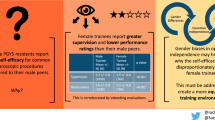Abstract
Background
Implementation of the Fundamentals of Laparoscopic Surgery (FLS) by the Society of American Gastrointestinal and Endoscopic Surgeons (SAGES) has served a need for educational structure for laparoscopic skill within General Surgery training since 2004. This study looks at how FLS affects resident self-efficacy (SE) with laparoscopic procedures.
Methods
We conducted a national survey, linked to the 2020 American Board of Surgery In-Training Examination (ABSITE), in which 9275 residents from 325 US General Surgery Training Programs participated. The online survey included multimodal questions that analyzed whether participants felt they could perform the most commonly-logged laparoscopic operations among residents [Laparoscopic Appendectomy (LA), Laparoscopic Cholecystectomy (LC), Laparoscopic Right Hemicolectomy (LRH), Diagnostic Laparoscopy (DL)] without faculty assistance. This used a 5-point scaled assessment, ranging from “not able to” to “definitely able to.” Multivariate analyses determined if completion of FLS made a difference for resident self-efficacy, stratified by post-graduate year (PGY).
Results
At the time of the survey, 2300 reported completion of FLS. The percentage of FLS completion increased from PGY1 to PGY5 (4.2% n = 59 vs 85.8% n = 893). PGY1 residents who completed FLS, from 48 diverse institutions, demonstrated the most significant increases in SE (p < 0.05) with significantly higher perceived self-efficacy in LA (p = 0.001) and LRH (p = 0.012). PGY2 and PGY3 residents indicated increased SE in DL (p = 0.037, p = 0.015, respectively), based on FLS completion. These FLS effects were less evident in the more senior classes.
Conclusions
Completion of FLS arguably has the greatest benefits for more junior residents, as it establishes a foundation of laparoscopic knowledge and skill, upon which further residency training can build. Successful completion of the curriculum and assessment offered by the Fundamentals of Laparoscopic Surgery leads to greater sense of ability in early trainees.




Similar content being viewed by others
References
Vassiliou MC, Feldman LS, Andrew CG et al (2005) A global assessment tool for evaluation of intraoperative laparoscopic skills. Am J Surg 190(1):107–113
McCluney AL, Vassiliou MC, Kaneva PA et al (2007) FLS simulator performance predicts intraoperative laparoscopic skill. Surg Endosc 21(11):1991–1995
Peters JH, Fried GM, Swanstrom LL et al (2004) Development and validation of a comprehensive program of education and assessment of the basic fundamentals of laparoscopic surgery. Surgery 135(1):21–27
Sroka G, Feldman LS, Vassiliou MC, Kaneva PA, Fayez R, Fried GM (2010) Fundamentals of laparoscopic surgery simulator training to proficiency improves laparoscopic performance in the operating room—a randomized controlled trial. Am J Surg 199(1):115–120
Okrainec A, Soper NJ, Swanstrom LL, Fried GM (2011) Trends and results of the first 5 years of fundamentals of laparoscopic surgery (FLS) certification testing. Surg Endosc 25(4):1192–1198
Bandura A (1977) Self-efficacy: toward a unifying theory of behavioral change. Psychol Rev 84(2):191–215
Anderson TN, Payne DH, Dent DL, Kearse LE, Schmiederer IS, Korndorffer JR (2020) Defining the deficit in US surgical training: the trainee’s perspective. J Am Coll Surg. https://doi.org/10.1016/j.jamcollsurg.2020.11.029
Chen G, Gully SM, Eden D (2001) Validation of a new general self-efficacy scale. Organ Res Methods. https://doi.org/10.1177/109442810141004
Cullinan DR, Schill MR, DeClue A, Salles A, Wise PE, Awad MM (2017) Fundamentals of laparoscopic surgery: not only for senior residents. J Surg Educ 74(6):e51–e54
Fairfax LM, Christmas AB, Green JM, Miles WS, Sing RF (2010) Operative experience in the era of duty hour restrictions: is broad-based general surgery training coming to an end? Am Surg 76(6):578–582
Friedell ML, VanderMeer TJ, Cheatham ML et al (2014) Perceptions of graduating general surgery chief residents: are they confident in their training? J Am Coll Surg 218(4):695–703
Bilgic E, Kaneva P, Okrainec A, Ritter EM, Schwaitzberg SD, Vassiliou MC (2018) Trends in the fundamentals of laparoscopic surgery® (FLS) certification exam over the past 9 years. Surg Endosc 32(4):2101–2105
Bandura A (1997) Self-efficacy : the exercise of control. New York, W.H, Freeman and Company
Frank JR, Snell LS, Cate OT et al (2010) Competency-based medical education: theory to practice. Med Teach 32(8):638–645
Author information
Authors and Affiliations
Corresponding author
Ethics declarations
Disclosures
Drs Schmiederer, Kearse, Jensen, Anderson, Payne, Dent, and Korndorffer have no conflicts of interest or financial ties to disclose.
Additional information
Publisher's Note
Springer Nature remains neutral with regard to jurisdictional claims in published maps and institutional affiliations.
Accepted for a Poster Presentation at the 2021 SAGES Annual Meeting in Las Vegas, NV Tuesday August 31, 2021—Friday September 3, 2021.
Rights and permissions
Springer Nature or its licensor holds exclusive rights to this article under a publishing agreement with the author(s) or other rightsholder(s); author self-archiving of the accepted manuscript version of this article is solely governed by the terms of such publishing agreement and applicable law.
About this article
Cite this article
Schmiederer, I.S., Kearse, L.E., Jensen, R.M. et al. The fundamentals of laparoscopic surgery in general surgery residency: fundamental for junior residents’ self-efficacy. Surg Endosc 36, 8509–8514 (2022). https://doi.org/10.1007/s00464-022-09443-z
Received:
Accepted:
Published:
Issue Date:
DOI: https://doi.org/10.1007/s00464-022-09443-z




